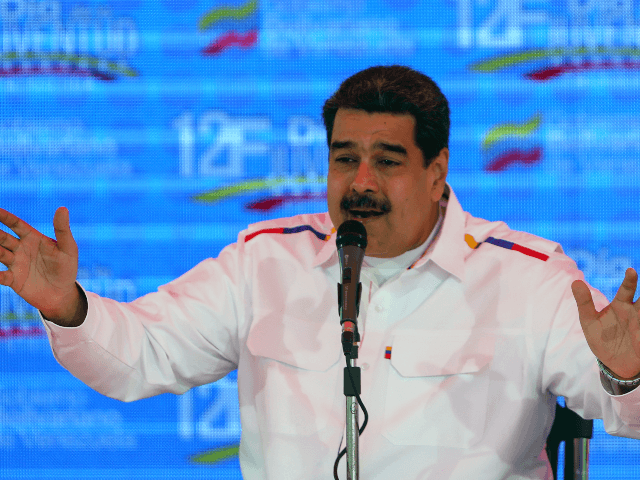A prominent member of Venezuela’s socialist regime distanced boss Nicolás Maduro from the Colombian terrorist organization FARC’s return to violence on Thursday, insisting Maduro has “nothing to do” with the group.
Two senior members of the Revolutionary Armed Forces of Colombia (FARC) who had disappeared in recent months after being offered uncontested Colombian Senate seats resurfaced in a video Thursday morning declaring war on the Colombian government. The men, surrounded by armed terrorists and standing under a banner featuring Venezuelan founding father Simón Bolívar, did not disclose their location, but law enforcement experts have long suspected close ties between the FARC and the Maduro regime.
The two fugitive terrorists, FARC second-in-command “Iván Márquez” and Senator “Jesús Santrich,” accused the Colombian government of breaking the 2016 peace deal brokered with the Cuban communist government that guaranteed the terrorists ten uncontested Senate seats and legal impunity for “political” crimes. The agreement never specified what distinguished a “political” crime from a “non-political” crime.
FARC terrorists traditionally adopt pseudonyms.
Santrich disappeared after being released from prison this spring. Colombian authorities arrested Santrich and charged him with attempting to smuggle 10,000 kilograms of cocaine into the United States.
The FARC has for over half a century generated much of its revenue from illicit drug trafficking, particularly cocaine.
On Thursday, senior Maduro regime official, television host, and alleged cocaine cartel boss Diosdado Cabello sought to distance the regime from Santrich and Márquez.
“Today they are blaming us from Colombia. We lament profoundly what is happening in Colombia,” he said at a rally for “international workers.” “That didn’t start because of Venezuela’s fault, that started because, in Colombia, the oligarchy killed Jorge Eliécer Gaitán.”
Gaitán, a Colombian presidential candidate, was assassinated in 1948. The FARC was founded in 1964. Cabello did not elaborate on what connection he believed those two events had.
“What does this have to do with Venezuela? Nothing,” Cabello insisted.
Cabello is widely believed to be the head of the “Cartel de los Soles,” an intercontinental cocaine trafficking syndicate based in the Venezuelan military. Others directly tied to Maduro involved in the drug trade include Franqui Francisco Flores de Freitas and Efraín Antonio Campo Flores, the dictator’s nephews, who were sentenced to 18 years in prison in 2017 for attempting to smuggle 1,700 pounds of cocaine into America. The nephews reportedly told U.S. law enforcement officials the cocaine belonged to Cabello.
Márquez declared in the video posted Thursday that the FARC would returned to “guerrilla struggle,” meaning terrorism, and “continue the legacy of [FARC founder] Marulanda and Bolívar,” using language similar to that typically used by Maduro and his “Bolivarian” Revolution. He made clear that the FARC would cooperate with another Marxist terrorist group, the National Liberation Army (ELN), to destroy government targets.
“We will seek to coordinate efforts with the ELN guerrilla [National Liberation Army, a Marxist terrorist organization] and with those comrades who have not handed over their flags,” Márquez said. “We will prioritize dialogue with businessmen, farmers … the target is not the soldier or policeman respectful of the interests of the people, it is the oligarchy – the exclusionary and corrupt mobster oligarchy.”
Colombia’s high commissioner for peace, Miguel Ceballos, told media outlets there that the revelation of an alliance with the ELN confirms that the FARC has established itself in Venezuela.
“Iván Márquez himself made clear that he is allied with the ELN,” Ceballos told Colombia’s Caracol TV. “We all know that the ELN is a guerrilla group that has a wide presence in Venezuelan territory.” As much as 47 percent of the ELN’s membership is stationed in Venezuela, Ceballos alleged.
In another interview with the country’s W Radio, Ceballos said collaboration with the Maduro regime could pose “a very big challenge to national security” to Colombia if Maduro is using guerrillas to consolidate power next door.
A government source corroborated Ceballos on background, telling the newspaper El Tiempo that the administration of President Iván Duque has “no doubt that the video … was recorded in Venezuela, where the ELN maintains a presence, but obviously it is being analyzed for an official report.”
Santrich and Márquez had received government amnesty from prosecution for being part of the 2016 peace deal, forced on the country despite Colombians voting against it in a nationwide referendum. On Friday, the Special Jurisdiction for Peace in Colombia (JEP), the agency run by Ceballos, rescinded that amnesty.
Duque independently announced a reward of 3 billion Colombian pesos ($866,610) to anyone who can provide Colombian law enforcement with information on the whereabouts of the terrorists in question and formed a special military unit to find and arrest them.
“Colombia does not accept threats of any nature, and much less from drug traffickers,” Duque said in a national address. “Colombians must be clear that we are not before the birth of a new guerrilla, but before criminal threats made by a gang of narco-terrorists who count on the security and hospitality of the dictatorship of Nicolás Maduro.”
Duque’s government has repeatedly accused Maduro of harboring drug traffickers and terrorists. In February, Duque officials lamented that more junior FARC terrorists had reportedly established themselves in Venezuela and were urging what many media outlets are calling “dissent” from the original FARC, assuming that the main leadership of the FARC abandoned terrorism with the 2016 peace deal. The only top official in the FARC to condemn Márquez and Santrich has been the head of the FARC, “Timochenko,” who said he felt “shame at seeing the comrades” in the video.
Follow Frances Martel on Facebook and Twitter.

COMMENTS
Please let us know if you're having issues with commenting.